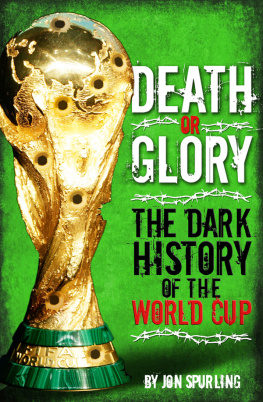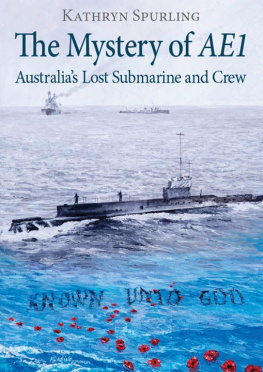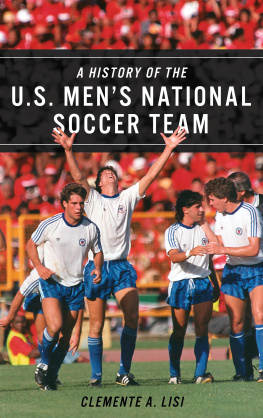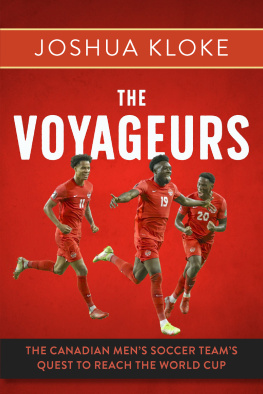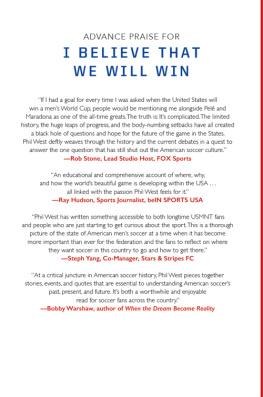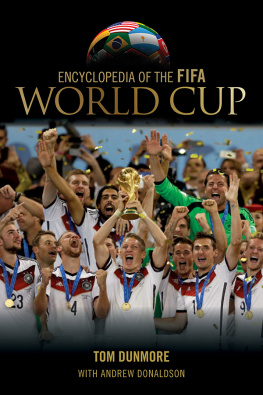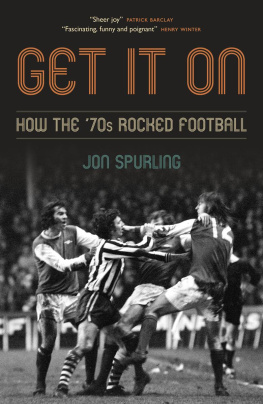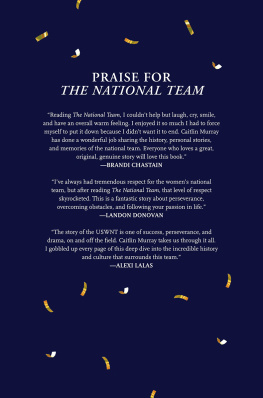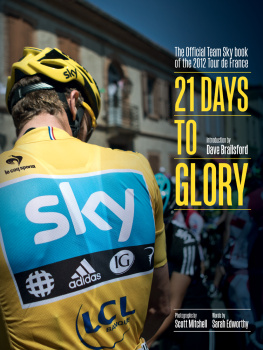DEATHORGLORYTHE DARKHISTORYOF THEWORLD CUPBy JON SPURLING
Published by Vision Sports Publishing in 2010
Vision Sports Publishing
19-23 High Street
Kingston upon Thames
Surrey
KT1 1LL
www.visionsp.co.uk
Epub ISBN 9781907637025
Book ISBN 978-1905326-80-8
Jon Spurling
All rights reserved. No part of this publication may be reproduced, stored in a retrieval system, or transmitted in any form or by any means, electronic, mechanical, photocopying, recording or otherwise, without the prior permission of the publishers.
This book is sold subject to the condition that it shall not, by way of trade or otherwise, be lent, re-sold, hired out, or otherwise, without the publishers prior consent in any form of binding or cover other than that in which it is published and without a similar condition including this condition being imposed on the subsequent purchaser.
A CIP record for this book is available from the British library
Design: Neal Cobourne
Copy editing: Ian Turner
All pictures: Getty Images
Typeset by Palimpsest Book Production Limited,
Grangemouth, Stirlingshire
For the Spurls girls Helen and Phoebe
ACKNOWLEDGEMENTS
This book wouldnt have been possible without the cooperation and assistance of many people over the last ten years.
The following fans, players and journalists gave of their time freely and generously: Essam El Khabar, Alaa Maihoub, Emad Al-Khidir, Alberto Villalta, George Male, Alan Ball, Simon Anstell, Juan Peroto, Sir Bert Millichip, Sir Neil Macfarlane, Mike Langley, Kenny Sansom, Daniel Gordon, Denis Barry, Luis Galvn, Fritz Plantin, Roger St Vierre, Roger St Vil, Mwepu Ilunga, Claude Fevre, Ilunga Mwepu, Paulo Csar Lima aka Caju, David Voares, Dad Maravilha, Manuel Kalmes, Elza Simone, Hugh Johns, Albeiro Usuriaga, Juan Carlos Metiche, Pierre Dierdiste, Raul Gorriti, Freddy Rincon, Emmanuel Manno Sanon, Bob Lemoine, Mehdi Minavand, Atefeh Aghili, Che Bum Hohn, Berti Vogts, Luque, Wolfgang Blockwitz, Prine Felipe, Constantin Stanciu, Carlos Aquiem, Denis Silva, Manuel Molares, Joe Namphy, Jean Antoine, Daniel Blume, Diego Vasquez, Dieter Lehmann, Juan Derada, Martin Hoffman, Georg Buschner, Wolfram Loewe, Fritz Polster, Enzo Meifredi, Guiseppe Meifredi, Mario Perazzolo.
For those of the above who are no longer with us, I hope Ive accurately recorded their conversations with me.
Special thanks to my fixer/translator in Rio, Carlos Marinez. Without his tenacity and extensive contacts, the Brazil chapters would be devoid of any joie de vivre. He told me that hed convince me that Rio is the worlds most vibrant city. I didnt need a great deal of persuading. Thanks to Hector Nunez and Celso Edmundes in Colombia and Juan Voares in Buenos Aires for putting me in touch with such passionate football fans and players. Jaime Marena my Central American spy I never knew where you were from one month to another. Now I dont know where you are at all, but thank you for helping me hack back the conjecture surrounding The Ftbol War. Jean Samou in Port au Prince; I hope that you and your family are safe and well.
Thanks to Alex Bellos, David Winner and Jonathan Wilson for guidance and assistance over the course of writing the book.
Thanks to Hugh Sleight, Matthew Weiner, Jon Crampin and Louis Massarella, who have commissioned Four Four Two articles so regularly over the years. Likewise to Andy Lyons at When Saturday Comes, Mike Berry at Backpass and Richard Lenton at Football Punk. Thanks also to Anthony Teasdale and Stu Messham for all their encouragement and help back in the days of Maxim and ICE.
Big thanks as ever to my mates. I finally wrote a non-Arsenal book. Maybe more of you will read beyond the acknowledgements this time! Barry, Phil and Tatiana, Seb and Marnie, Jo and Gareth, Louise B, Adam and Nicky, Brummie and Ruth, Ian and Anita, Tim and Lucy, Steve and family, Si and Sandra, Si Barrick, Charlie and Natalie, Louise C, Catherine, Grant, Sam and Simon, and Paul and Vicky, Clare and William. Brendon thanks for your wit and wisdom at games and The Auld Triangle and for discovering The Trevi. A real find!
At work, thanks to other Cornwallis fixtures and fittings Helen (for putting up with my mess in our office), Vicky (Shut up Spurling, you talk too much) and Olivia, who has been there with me from the off. Thanks also to Chris aka Jonesy, and to Hannah in the Department. Bally, of course I read your emails. Cheers to Rob Wilkinson, Emma Fuller and to Matthew El Gaucho Spall for their lightning quick translations and to Paul and Geoff for all the Arsenal conversations about Baptistas shoulders, Bendtners finishing, and how much we all loathe international friendlies.
I owe a massive thanks to my agent David Luxton, who made the book possible, and to Jim and Toby at Vision Sports Publishing for their faith in the book. Thanks to Ian Turner for his careful copy editing.
Thanks as ever for the support (Not another bloody football book!) provided by my Mum and Dad, Helen Murray and Stuart.
And to Helen and Phoebe, thanks for all your patience and support. The book is finished now. Time for a Spurls hug!
INTRODUCTION
In 1928, when Jules Rimet finally convinced his crusty FIFA colleagues that the idea of a football World Cup might just have some mileage, he couldnt have imagined what a monster hed unleashed. The Frenchman spoke of a tournament which would unite nations, revolve around rules, comradeship, and fair play, and encourage mankind to be one due to football. The reality has been somewhat different, and although a number of iconic images burn brightly in the memory there are a raft of edgier and darker stories lurking behind the gold, glitter and confetti. Several national teams journeys have been exploited by despots, others simply reflect the fraught state of play in the country at that time; sometimes both.
As an eight year old I was impressed by my Dad snorting derisively at Argentinas victory in 78 and claiming: Their military has fixed that. The World Cup has always fascinated me, especially the seamier side. In the latter part of last century I dusted down my passport (by March 2010 I will have travelled to nine countries purely for the sake of football writing) and began to crowbar contacts at Four Four Two and When Saturday Comes into opening up their address books to help me compile a truly unvarnished history of the tournament. On my travels Ive been beaten in an arm wrestle by a 95 year old former juvenile delinquent in a Buenos Aires bar, met the original rebel of Colombian football in Medellin and it isnt Higuita or Asprilla and interviewed the long forgotten architect of East Germanys finest hour at the 1974 World Cup, who insisted his team drove Trabants to keep them away from the prying eyes of the STASI. My research has brought me into contact with a huge array of remarkable people, each with their tale to tell. Their testimonies throw up scandals old and new, destroy a few well established urban myths and reveal dozens of heroes and villains; some of those interviewed could even be categorised as both.
The majority of stories have dictators, killers, and societal upheaval either lurking in the background, or screaming at readers in the foreground. Its most certainly not a balanced approach to the history of the World Cup, and its not intended to be. Many of the tournaments pivotal incidents, due to the globalisation of football culture, are so enshrined in the collective consciousness and have been analysed so remorselessly that they have reached a kind of saturation point. When I was in Rio, former Brazil striker Jairzinho nixed my interview requests, explaining: The problem is that Im not sure what else there is to say about what the team achieved in 1970. I think all the stories have dried up. Its a fair point; just how many revisionist arguments can there be on why England have consistently screwed up since 1966? How many more superlatives can be deployed to describe the swashbuckling French in 1998, or Brazil in 1970? Theres nothing in this book, for instance, about Gazzas tears, or Marco Tardellis crazed celebration in 1982. I figure that those events and images are well covered elsewhere and will appear in numerous montages on TV throughout the summer of 2010.
Next page
